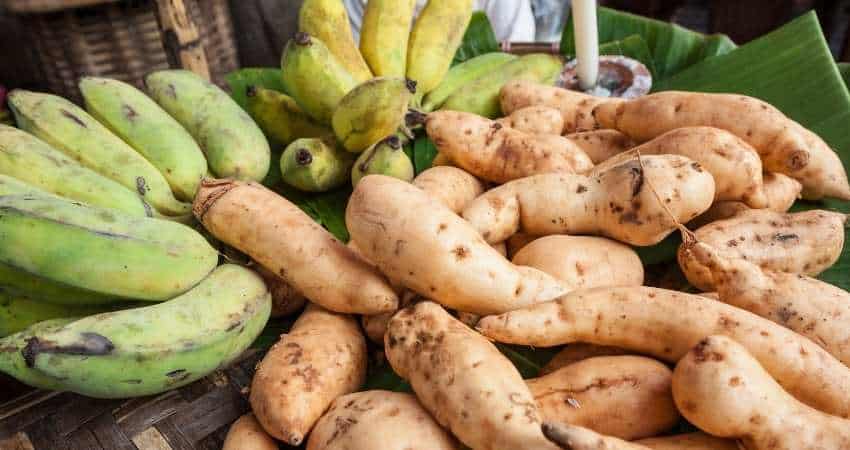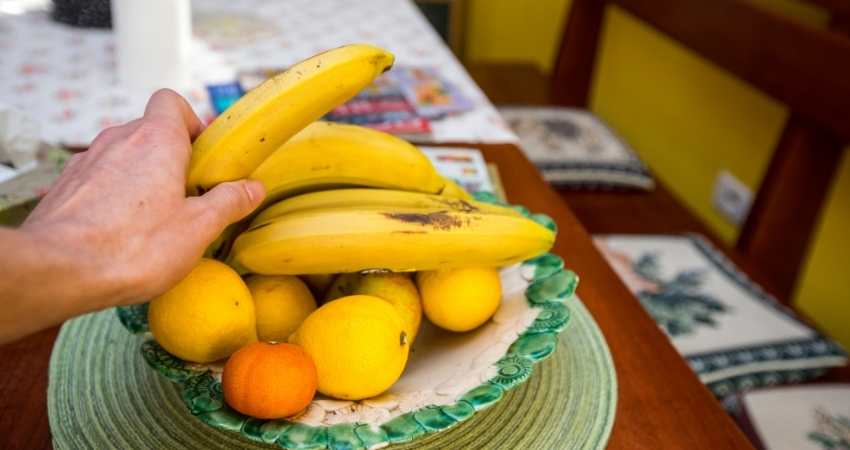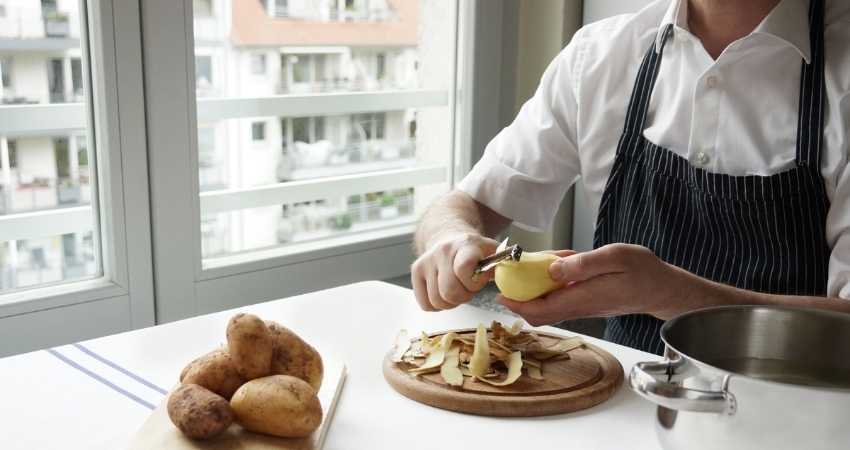Can You Store Bananas and Potatoes Together?
If you have bananas and potatoes, you might be wondering if you can store them together.
Bananas and potatoes can’t be stored together because as they ripen, bananas exude ethylene gas, which causes the potatoes to start sprouting. On their part, potatoes release moisture, which can lead to the bananas spoiling faster. Therefore, it’s best to store the two separately.
During my health coaching sessions and pantry makeovers, I often get asked about storing bananas or potatoes. Therefore, I have done extensive research on the topic.
This article will provide detailed information on:
- Why you should not store bananas and potatoes together.
- Why spoilage occurs.
- The best way to buy and store your bananas and potatoes.

The Best Way to Store Your Bananas and Potatoes
Ethylene is a gas that affects the shelf life of most fruits and vegetables. This natural, invisible, odorless gas assists in the fruit ripening process ((National Center for Biotechnology Information: Ethylene detection in fruit supply chains)).
As a fruit produces more and more ethylene, it forms enzymes that tear down cell walls and starches. This causes the fruit to become softer and sweeter or, in the case of potatoes, to bud or sprout.
In general, it’s best not to store fruits and vegetables together, whether in cabinets, the pantry, or on the counter1. Even in the refrigerator, the ideal way to store produce is in separate compartments ((Seattle.gov: Fruit & Vegetable Storage Guide)).
The United States Department of Agriculture (USDA) also endorses sealed crisper drawers for fruits and vegetables2.
Consider the storage location and temperature as well. Some fruits, such as unripe bananas, lose their flavor and moisture if kept at low temperatures. If you keep potatoes in a damp place with a limited circulation of air, they turn moldy. Ultimately, all this food becomes unpalatable and finds itself in the garbage.
So, how can you control the speed at which your bananas produce ethylene, keep them fresh, and thereby enhance their shelf life? Furthermore, how can you prevent ethylene-sensitive potatoes from sprouting early? Let’s find out in the next section.

How to Store Bananas
Many bananas release a lot of ethylene, which causes them to ripen much faster than they would if they were separate. Besides, storing bananas in bags or sealed containers traps the gas and quickens their ripening, according to The UC San Diego Center for Community Health3.
Unfortunately, it’s not very easy to pinpoint precisely when perfect ripeness occurs. Luckily, ripe bananas feature brown spots, which indicate that the resistant starches within have turned into sugars4.
Overripe bananas are also delicious and excellent for making smoothies, milkshakes, and baking bread or muffins.
So, how do you store your bananas to keep them fresh longer?
Storing Raw Bananas
Can you store your raw bananas in the refrigerator? This is not advisable. Since bananas are used to warm temperatures, their ripening enzymes become inhibited by cold temperatures5. As a result, other enzymes lead to cell damage or blackening of the skin.
Bananas prefer temperatures of around 50°F (10°C). Still, you can freeze your bananas for use later. Peel, cut into small pieces, and place them in your freezer in airtight containers.
To ensure your bananas keep fresh for long, you need to separate them. This way, you allow the ripening process to slow down. Separating the bananas will also help them remain fresh until you are ready to eat them.
If you are looking to ripen your bananas faster:
- Place them in a brown paper bag for some days. To ripen them in a day, add an apple or tomato.
- Keep them near other ripe bananas.
Ethylene is also used commercially to ripen fruits, including bananas. While still green, they are harvested, shipped to various markets, and ripened under controlled conditions.
Storing Ripe Bananas
Store your ripe bananas in your refrigerator’s vegetable compartment. While refrigeration slows down the ripening process, it doesn’t stop it entirely, and the peel continues to brown.
Nevertheless, the bananas will stay tasty, fresh, and firm for 1 to 2 weeks. What’s more, you can store peeled overripe bananas in your freezer for your smoothies and baked goodies.
Other methods of slowing down the ripening process include:
- Injecting carbon dioxide into a container of bananas to keep ethylene levels low and prevent the bananas from producing more.
- Placing the bananas next to unripe fruits like avocados.
- Wrapping the banana stems in plastic wrap to stop ethylene gas from reaching the rest of the fruit.
Ultimately, the above actions will help minimize waste and save you money.

How to Store Potatoes
Did you know that keeping potatoes in your refrigerator turns their starch into sugar, affecting their taste and texture?
Potatoes prefer a cool, dark place with good airflow and temperatures of about 45°F (4.4°C)6. Note that you can keep “new” potatoes (small and harvested before maturity) in the refrigerator.
Still, ensure that you place them in a brown paper bag so that it can absorb the moisture they emit.
Remove any clinging soil before storage. With time, your potatoes will start growing roots from the eyes. This happens when they are left too long, so it’s best to use them before sprouting occurs.
If you ever consider storing sweet potatoes long-term, check out my blog post right here, How to Store Sweet Potatoes for the Winter: The Complete Guide.
How to Choose Your Bananas and Potatoes
To extend the storage life of your produce, ensure that you select the freshest. If possible, shop at farmers’ markets or community gardens as such produce undergoes less transit time and tends to be fresher.
What to Consider When Buying Bananas
It’s essential to have the below points in mind when choosing your bananas:
- You may want to choose organic over regular. Discussing the pros and cons of organic would take a whole article which is why I wrote one. If you’re interested you can read it by clicking here, Organic Bananas vs. Regular Bananas: Which is Better?
- When buying green bananas, select firm ones without cuts or abrasions on the peel.
- Avoid dull-looking bananas or those with a grayish tint as this shows that they were refrigerated; hence proper ripening might pose a challenge7.
- Remove the bananas from their plastic packaging since the moisture inside could cause them to rot.
- If looking to buy ripe bananas, go for brown-spotted ones because they are the sweetest.
What to Consider When Buying Potatoes
When buying, follow these tips which will result in better storage and longer life.
Avoid potatoes that are decayed, discolored, wrinkled, with cuts or broken skin. They should be firm, smooth, and not show sprouting signs or green coloration. The latter indicates that they may contain solanine, a toxic alkaloid that gives them an undesirable taste.
Avoid cleaned potatoes because, without their protective coating, potatoes become more prone to bacteria infection.
If you have any questions to ask me about this article don’t hesitate to comment below or email us. You can find an email on our contact page.
Read Next – More Food Storage
The Complete Guide To Freezing Mushrooms
Can You Store Avocados and Oranges Together?
Can You Store Eggs in Tupperware
- Fruits & Veggies For Better Health: Certain Fruits and Vegetables Should Not Be Stored Together? [↩]
- USDA: Refrigeration and Food safety [↩]
- San Diego Center for Community Health: Ethylene in Fruits and Vegetables [↩]
- Montana State University: Bananas [↩]
- Fruits and Veggies for Better Health: Banana [↩]
- University of Idaho Extension: Options for Storing Potatoes at Home [↩]
- Berkeley Wellness: How to Choose and Cook with Bananas [↩]
